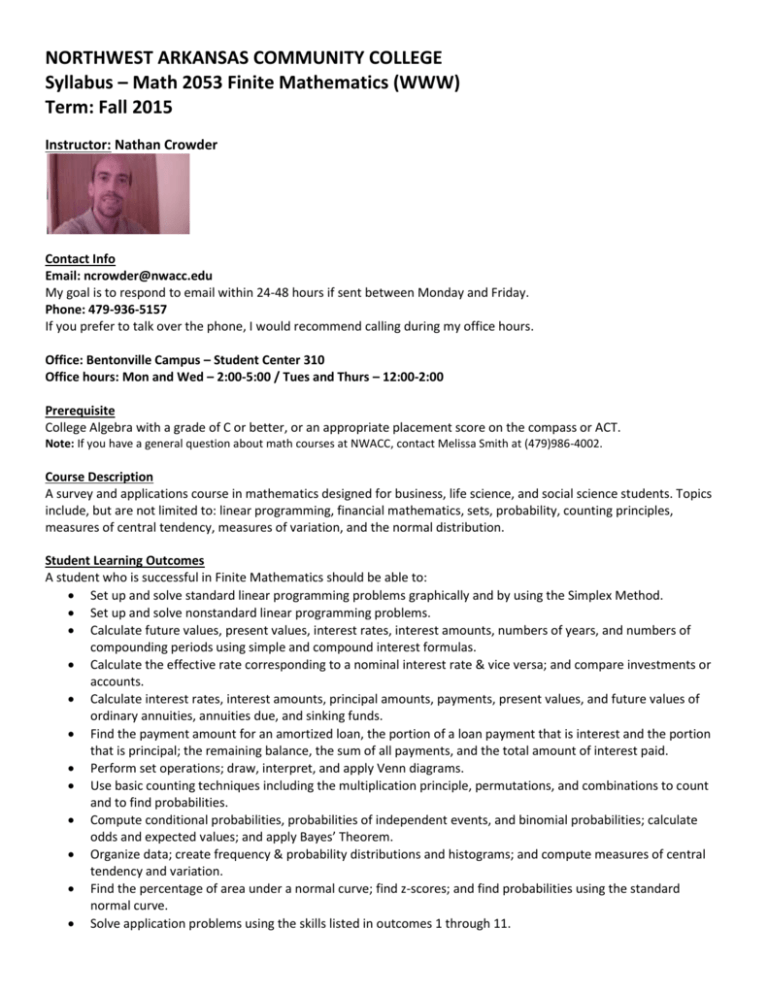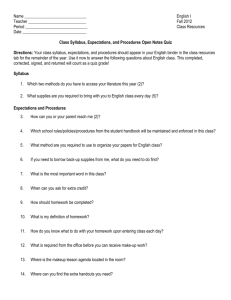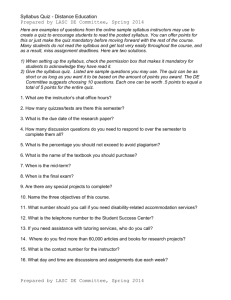Syllabus - Nathan Crowder
advertisement

NORTHWEST ARKANSAS COMMUNITY COLLEGE Syllabus – Math 2053 Finite Mathematics (WWW) Term: Fall 2015 Instructor: Nathan Crowder Contact Info Email: ncrowder@nwacc.edu My goal is to respond to email within 24-48 hours if sent between Monday and Friday. Phone: 479-936-5157 If you prefer to talk over the phone, I would recommend calling during my office hours. Office: Bentonville Campus – Student Center 310 Office hours: Mon and Wed – 2:00-5:00 / Tues and Thurs – 12:00-2:00 Prerequisite College Algebra with a grade of C or better, or an appropriate placement score on the compass or ACT. Note: If you have a general question about math courses at NWACC, contact Melissa Smith at (479)986-4002. Course Description A survey and applications course in mathematics designed for business, life science, and social science students. Topics include, but are not limited to: linear programming, financial mathematics, sets, probability, counting principles, measures of central tendency, measures of variation, and the normal distribution. Student Learning Outcomes A student who is successful in Finite Mathematics should be able to: Set up and solve standard linear programming problems graphically and by using the Simplex Method. Set up and solve nonstandard linear programming problems. Calculate future values, present values, interest rates, interest amounts, numbers of years, and numbers of compounding periods using simple and compound interest formulas. Calculate the effective rate corresponding to a nominal interest rate & vice versa; and compare investments or accounts. Calculate interest rates, interest amounts, principal amounts, payments, present values, and future values of ordinary annuities, annuities due, and sinking funds. Find the payment amount for an amortized loan, the portion of a loan payment that is interest and the portion that is principal; the remaining balance, the sum of all payments, and the total amount of interest paid. Perform set operations; draw, interpret, and apply Venn diagrams. Use basic counting techniques including the multiplication principle, permutations, and combinations to count and to find probabilities. Compute conditional probabilities, probabilities of independent events, and binomial probabilities; calculate odds and expected values; and apply Bayes’ Theorem. Organize data; create frequency & probability distributions and histograms; and compute measures of central tendency and variation. Find the percentage of area under a normal curve; find z-scores; and find probabilities using the standard normal curve. Solve application problems using the skills listed in outcomes 1 through 11. Required Materials 1) You will need to purchase a MyMathLab Access Code for the textbook we are using: Finite Mathematics with Applications, 11th edition. Lial, Hungerford, Holcomb, Mullins. When you enroll in the course you have the option to get trial access for two weeks, after which you must purchase an access code to continue. If you have used MyMathLab with the same textbook in the past, you will not need to repurchase access. You will NOT need to purchase a hard copy of the textbook for this class. All coursework (besides the syllabus quiz) will be done in MyMathLab. 2) Calculator: You will need a TI-83/84 calculator for the class. In addition, I suggest using a program called ROWOPS in chapter 7 (for problems involving the simplex method). Having this program will speed up the process and help cut down on arithmetic errors. You can get the program during my physical office hours or from the math center in SC 344A during their normal hours. I recommend doing this when you are on campus taking your first test. For equality purposes, I reserve the right to supply you with a default TI-83/84 calculator for exams, deleted of all programs except ROWOPS. Graphing calculators can be rented semester-long from NWACC by paying the rental fee at the cashier’s window. You must then bring your receipt and driver’s license to Jill Witt in SC 351 where she will assign a calculator to you. These calculators run out early in the semester. 3) Daily access to a computer. You need to check your school email once per day and you should be working on your assignments on a regular basis (at least a few times a week). Expect to spend a minimum of 8-10 hours a week at a minimum working on various elements of the course in order to be successful. Grading Policy Syllabus Quiz – 1% The syllabus quiz will insure that you have read and understand the syllabus. It will be administered in blackboard. As part of the initial participation requirements for the course you must score a 100% on the quiz. You can take it as many times as you need. Homework Average – 14% Homework assignments will be due on Monday at midnight. After the due date a 20% penalty will be deducted from those problems attempted after the assignment deadline. Consult the schedule for which sections are due on which dates. Furthermore, since one lesson builds on the previous, you must score a 70% on each homework assignment before you will be allowed to start the next one. MyMathLab normally gives you three attempts at the same problem before marking it wrong. You may click on “Similar Exercise” to get another problem that you can replace it with. You should aim for true understanding on the homework rather than just the correct answer. If you must use the help features to solve the problem, I recommend working the problem again in the following days until you are comfortable doing the problem without help. Quiz Average – 15% Quizzes will be due on Wednesday at midnight. You cannot make-up quizzes that you forget to take or are not prepared to take. You will be allowed take each quiz a total of 3 times and only your highest grade will be counted. Some of the problems on the retakes will be the same, but not necessarily all. I will drop your lowest 2 quiz scores from the grade calculation. 2 Semester Tests – 20% X 2 = 40% Tests are proctored and must be taken at an NWACC approved testing location or at a testing location preapproved by the instructor. An additional proctoring fee may be required for exams administered at a non-NWACC testing location. If at all possible I recommend testing at the NWACC testing center in SC 306. Their website (including contact info) is: http://www.nwacc.edu/web/ldc_testingcenter/index.php or http://tiny.cc/testingcenter If for some reason you must test at a different location you are required to notify me at least 2 weeks in advance, so that I have time to validate the testing center and insure that a proctor is available. Not all requests for off-site testing may be approved. Lack of a 2 week notice may result in your inability to test. Final Exam – 30% The final exam must be proctored and is cumulative. Approximately 40-50% of the material will cover chapters 9 and 10 which are not covered on the previous tests. The remainder of the material will come from the previous chapters. Your final percentage grade will be converted to a letter grade using the following scale: [90-100] = A, [80-90) = B, [70-80) = C, [60-70) = D, [0-60) = F Note: Your average showing in the gradebook inside MML may not always be completely current if there are assignments that you have not done. This is because I manually have to enter “0” for assignments that aren’t completed. There are currently no extra credit or bonus points available for this course. Make-up policy While the preliminary assignment sheet contains due dates for the course, these may change in rare situations. The final word on all assignment due dates is the date shown inside MML. As explained above, there is no opportunity to take a quiz after the due date, but homework problems done late will be scored with a 20% penalty. If you miss the deadline for a single exam and you contact me by the due date, I will allow you to take the exam the following week with the stipulation that you will not be able to earn any partial credit which was given on that exam. I still reserve the right to deduct points from your preliminary score if you do not support your answers with necessary work. This can only be done one time. If you miss the deadline for a second exam, you will receive a score of zero for that exam. Academic Dishonesty The attempted use of a prohibited calculator or program is academic dishonesty and will result in a score of 0 with no possibility of the score being dropped or replaced. This also applies to all other forms of academic dishonesty such as using unapproved formula sheets, notes, or other materials during exams. Further action will be taken according to the policy on Academic Honesty in the current Student Handbook. Additional course policies for this class may be found at: tiny.cc/NWACCpolicies Note: For our course you must do the following two things (within the first 2 weeks of class) to meet the initial requirement for participation and avoid being administratively withdrawn: 1) complete the syllabus quiz and earn a 100% on it 2) create an account in MyMathLab and begin the first homework assignment Withdrawal Dates The last day to drop the course and not receive a “W” on transcript is TBD. The last day to drop the course is TBD. You should consult financial aid and your academic advisor when considering whether to drop a class. Syllabus Acceptance and Changes By staying registered in this course beyond the first week of class you agree to the procedures and policies in this syllabus. If anything in the syllabus changes you will be notified via email. These changes will only be made if I feel that doing so will increase student success.






